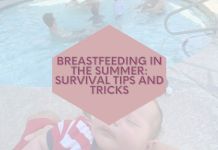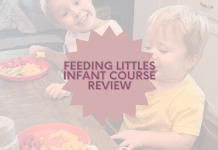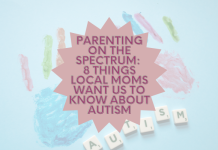Advanced Placement versus Dual Enrollment. ACT versus SAT testing. Career and technical education programs versus occupation-specific programs. The list goes on and on and on, and it’s like a flashback to when you first became a mom and didn’t know the difference between a binky and a lovey or a boppy and a bumbo.
We crowd-sourced this guide with a few of our contributors who are experts in this arena:
- Contributor Katie has four kids across high school, college and med school; She’s successfully navigated being a mom of high schoolers and is the most encouraging mom to help those of us stepping into this phase of parenthood
- East Valley Institute of Technology is one of Arizona’s best option high schoolers and parents. Their enrollment staff always take the time to answer questions about the high school and career planning especially helping to map out how EVIT can help meet the needs of families faced with the ever-increasing cost of a college education (two out of three EVIT students go on to higher education, many of them using their EVIT training to secure employment to help pay their college tuition).
- Contributor Ashley taught high school for 10 years and knows what’s what when it comes to navigating academic jargon, what’s important and what’s not, and how to utilize school resources
- Contributor Kim has three teens from 13 to 18 and is in the thick of juggling a student athlete, a gamer guy who’d rather stay home 24/7 and a special needs 18-year-old who they just secured guardianship for to continue caring for her as she legally became an adult. Kim’s advice is real and often accompanied with jokes that will make you belly laugh about the weird, hard parenting experiences we’re all going through.
Read on to get a survivalists guide to navigating some of the weird parts of parenting teens and navigating high school and career planning.
Our contributor’s favorite books for parenting teens
- 5 love languages for children (read it over and over)
- Boundaries for kids
- Quiet (life changer to understanding my quiet son who has a mom that’s never quiet 🤐).
- Parenting with Love and logic
- For parents only
Behind the wheel
Katie here! Long story short: my first kiddo took drivers ed in school and didn’t learn crap, but we taught her and she didn’t get into a wreck until sophomore year in college. My son (second kiddo) was chill and careful and I pretty much taught him but he was in a really bad wreck three months after having his license (didn’t eat all day and lots of pressure at school=a good kid that doesn’t see the stopped cars on Ellsworth and totals another car).
With child number three we are doing it differently: taking time to go over car, then to an empty block in Eastmark with nothing around to practice going around and around the block. Then lots of parking lot (15 times backing into and out).
Then, we did Ncontrol driving school (best school ever)!!! It was expensive, but they defensive driving she learned was invaluable.
Academics
Education Career and Action Plans
EVIT here! An ECAP is the student’s plan of coursework, career aspirations and learning opportunities. It is usually started during middle school, most often in 8th grade, and updated every year through high school to help personalize a student’s education.
When parents and students are completing the student’s ECAP, they should discuss whether the student has interest in attending East Valley Institute of Technology so they can plan their high school years accordingly. EVIT offers over 40 career training programs tuition-free for East Valley high school students.
Most EVIT programs are two-year programs. All are half-day programs. Students typically start EVIT as juniors. So it’s very important for 8th-graders and freshmen who want to attend EVIT as juniors and seniors to make sure they are focused on completing graduation requirements earlier in high school rather than loading up on electives.
The most common reason students drop EVIT programs is because they suddenly realize they haven’t met all their graduation requirements and they need to stay at their high school to complete those classes.
Learn more on EVIT’s FAQ page all about these plans here.
Vocational versus College Prep
EVIT here, again! EVIT is a great option for high school students whether they want start a career right after high school or if they are planning to go on to college.
EVIT programs prepare students to earn industry certifications and licenses which makes them more employable. Some students use this opportunity to get a job in the industry they are interested in – and then work in that job while going to college.
In fact, 2 out of 3 EVIT students go on to college every year, while many others immediately start working in their chosen career or go on to the military.
Standardized testing
Even with many universities making these tests “optional” for admission, many are still using the scores for scholarship and even direct admission into competitive majors such as business, nursing, and engineering.
- SAT dates: March 13, 2021 May 8, 2021, and June 5, 2021
- ACT dates: April 17, 2021, June 12, 2021, and July 17, 2021
College admissions
The pandemic has created chaos in all walks of life, especially in an area that most felt overwhelmed with previously. High school students planning to attend college are no longer able to take campus visits to prepare for their future decisions, and some in-person resources are no longer available.
We connected with Shawn Coats, M.Ed. a College Prep Advisor at Class 101 Mesa-Gilbert, to share the top three tips to ensure a smooth college planning and admissions during the pandemic:
- Early admission deadlines are approaching, and students should be prepared to submit their applications, college essays, letters of recommendations, and schedule interviews to increase their chances of admission.
- Colleges are still looking for extracurricular activity involvement with students. Shawn has several online options for students to enhance their application.
- Colleges are now tracking IP addresses of interested students and logging the amount of time that the student is on the website, how many emails they open and click on, and if they are following their social media channels. Shawn advises setting up a plan to create regular interactions with the college that you are interested in.
Student athletes
Kim here! Seriously, talk to people. Chat up the other parents. Get to know the coaches. So much in the sports world (and performing arts, I would assume) is word of mouth recomme ndations for resources, trainers, opportunities, etc. I always ask the best sources and try to my research but do my best just chatting with parents who have gone before us and coaches.
ndations for resources, trainers, opportunities, etc. I always ask the best sources and try to my research but do my best just chatting with parents who have gone before us and coaches.
To support student athletes as parents, we need to let the coaches do the coaching. Our job is to nurture, nourish and support—to be their safe place after a tough loss, and biggest cheerleader on big wins. I’ve found that often it’s just as important to be someone to talk about anything but their sport. Remembering your child has more interests than their sport—even when that sport dominates your lives. Talk about more than their stats and games. They need to know you value all of them not just that athlete.
The lingo
Ashley here! As someone who worked all day with teenagers and tried so hard to get to know all 200 on a personal level to connect their education to their real life. I realized that I am totally lame (and totally okay with it).
However, I’ve also realized that teenagers are speaking in lingo we don’t understand is sometimes done on purpose. There are so many things they say that adults ignore because it is “harmless,” however it could lead to dangerous conversation and antics.
So I’ve put all the lingo and definitions I know, and hear frequently in the hallways to good use. Adults can use this info to connect with their teens and seem “hip” or more easily relate-able. You can use this lingo to embarrass or have fun of your teenagers, or even to start conversations. Some of this lingo you can use to keep tabs on teenagers you may worry about. However you want to use it- go for it! Here is what I’ve learned:
- Bet: this is used when you are in agreement with something, or confirming a plan.
- Fam: is used to describe your best friends, not your actual family.
- GOAT: Acronym for “Greatest of all Time” but not used as an acronym but rather a word in conversation.
- Shade: usually being “thrown”. You’ll hear that someone is “throwin’ shade” which is similar to when we used to say someone is being shady. To throw shade basically means you are making a rude remark about someone else.
- Ship: Is short for relationship, and means that those two people should be together.
- Sis: This one took me a while to process. Like most adults, I thought this was a term of endearment like she is my sis. However, it actually means there is a whole lot of drama or a long story with gossip ahead. If teenager A asks what happen at the dance, teenager B will simply respond with “sis” meaning a lot of drama unfolded and it is a long story they will share later.
- Stan: a super-obsessed fan
- Sus: Is a suspect or someone who shouldn’t be trusted.
- Tea: There are 3 very odd ways teenagers use the word “tea” basically you can “sip your tea”, you can be “spilling tea” or you can be “having tea.”
 “Sip your tea” means you are minding your own business and staying out of whatever gossip is happening. “Spilling Tea” means you are sharing gossip that you have. “Having Tea” means you have some gossip that you’re about to share.
“Sip your tea” means you are minding your own business and staying out of whatever gossip is happening. “Spilling Tea” means you are sharing gossip that you have. “Having Tea” means you have some gossip that you’re about to share.
- Thirsty: Unfortunately does not mean they are lacking in hydration but rather describes being “desperate” or trying to get attention.
- VSCO: VSCO is a term usually used as VSCO Girl, pronounced Vis-co. Which a term for girls who fit a certain atheistic or lifestyle. Usually when someone is wearing Birkenstock, using a hydro flask, wearing scrunchies, leggings with oversized shirts or things of that nature they are termed a “VSCO GIRL”.
Side note: There are two terms within the VSCO that need to be shared sksksksk which is normally a keyboard thing, can also be a word used which can mean laughter, awkwardness, or even something similar to “OMG” or “I can’t even.”
- Weak: when something is so funny or hilarious they will say “I’m weak”
- 9: Is something new, that means an adult, or more specifically a parent is watching. If you hear or see 9, be on alert.
There are a lot more that are more specific to text or Snapchat that are acronyms for dangerous things/behaviors. If you want to keep teens safe in an internet frenzy day and age, I highly suggest educating yourself on the lingo!












